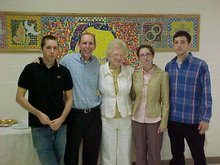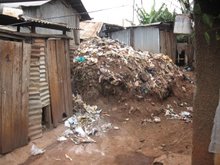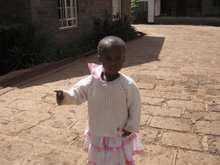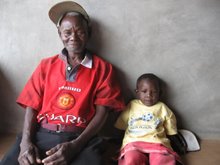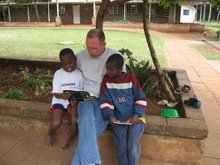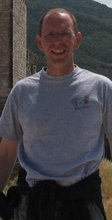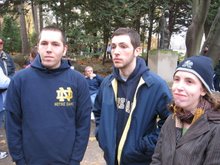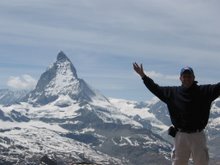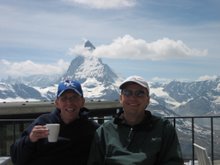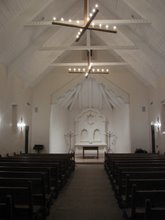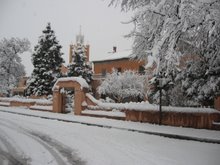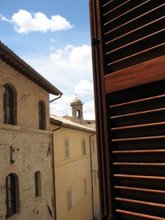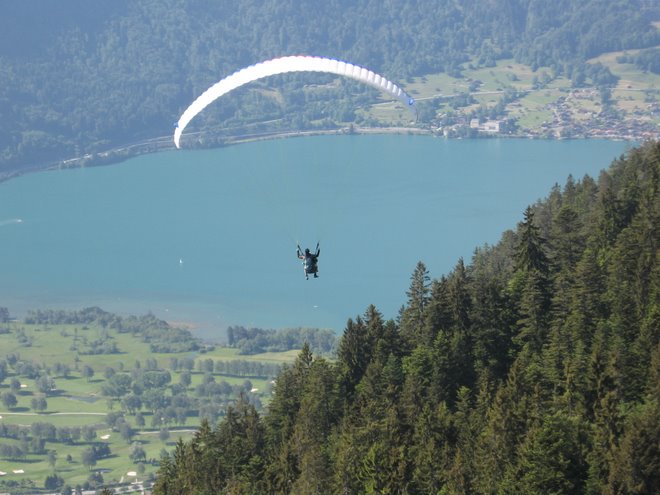I am sure that the full impact of departing my work will not sink in for a while. The last days were sweet and affirming. I am filled with the generosity of people, the tenderness of my staff and parents and struck by the freedom with which the younger kids give away their love and kindness. The days could not have been better and I am grateful to those who kept to my wishes of ending the year as we always have. In a year filled with some "drama", the last days were appropriate and, I hope, Spirit-filled.
I am trying to set up an account for those who want to communicate with me during my time away and who have expressed wishes to contribute financially to the projects with which I am involved. This blog will be a good place to get the word out - at least until I leave in early September.
Those who know me, know my love for contemplation, prayer and silence. Those who know me well know the dangers I could face in running to the silence and solitude, as a way to avoid the "real" and the messy. I have been toying with the idea of trying to integrate a communal life in Africa with a contemplative life. On prior trips to the monastery, I asked myself if a contemplative lifestyle would be one I was called to. Always, the answer was a firm "Heck no!" I graduated from Xavier long ago with a Theology degree, begging the question - "So you want to be a priest?" Again the answer "Heck no!" I joined an intentional lay community when I was younger because I believed in the gift of community and lived a shared lifestyle for many years. But - there was always that desire to also have a life of structured prayer. The monks live daily with a WORK and PRAY lifestyle. I like that - add to it a strong community and I think I could get use to it. So, what I am thinking - as I learn more about what my situation may be in Kitui, I might try to structure my days more in the tradition of that WORK and PRAY lifestyle. With no electricity in the Village, I am guessing things wrap up when the sun goes down. What an opportunity to pray the sun up and pray the sun down each day. I have hoped for another or someone to share this adventure, so maybe there will be some communal aspect to the life in the Village - either with the residents or the volunteers. Who knows what God has planned.
So . . . I am just in the beginning thoughts of integrating prayer and contemplation in Africa. My friends in New Mexico do it well - at the Center for Action and Contemplation. They have the right idea. Not knowing what I will find when I head to Africa, it is hard to imagine the life and much, I am sure, has to be free-flowing and I need a "play-it-by-ear" mentality. But as we head to Gethsemani for a few days next week, there are some things I can keep in mind. If there is one thing I know for sure - I need a prayer life to keep moving. It is a gift of the Spirit that I could loose if it is not used.
Saturday, May 26, 2007
Wednesday, May 23, 2007
It takes a VILLAGE
I received some more info on life in the Nyumbani Village - 3 hours from Nairobi. Some of the friends I met when I visited Nairobi put together a manual of things one should know before coming to Kitui. Here is a sample:
"The variety of work that needs to be done is endless. There is a lot of manual labour which is performed by the volunteers. Activities in the past have included building chicken coops, beekeeping, dairy farming, picking maize, etc. There is help needed in the school which houses children in standards one to four and with organizing and supervising children's activities. Because of the growing nature of the village it is impossible to predict what each volunteer's specified duties will be, therefore flexibility is needed. Past volunteers have found working in the village to be very rewarding.
There is no electricity and limited running water in the Village. Volunteers typically work from 8am to 5pm Monday to Friday with weekends off.
Accommodations - houses located on the Village property. Each house contains 3-4 rooms, each volunteer has their own room (provided space is available) with a twin bed. Each room has a bathroom with a pit toilet. When running water is available there is a tap located outside of the house which can be used for bathing, washing clothes, etc (but not drinking).
Meals are prepared for the staff and volunteers in the area next to the kitchen. There is limited opportunity to purchase food at local vendors as transportation is very limited and the nearest town is about a three hour walk from the Village. There are also no cooking facilities located in the volunteer cottages. Volunteers must also purchase drinking water before heading up to the Village as there is no suitable drinking water. Volunteers will have the opportunity to purchase any food, water, or supplies in Karen (where Nyumbani Children's Home is located) before they are transported to the Village.
Laundry -hand-wash clothes over the designated washing stations. Volunteers will need to purchase their own laundry detergent before arriving at the Village.
Transport to and from any of the towns near the Village is very limited. Volunteers may ride along with drivers who are running errands but this would need to be arranged with Nicholas Makau, the village manager.
Medical Care - Volunteers are provided with the medical care available here at Nyumbani Village. If you are feeling ill, need a blood sample, or just need to speak to a nurse one can be found at the sick room.
Malaria - is a major concern when working at the Village so all precautions must be taken. You should consult with your doctor about which malaria medication is best suited for you. You must bring a mosquito net and repellent in order to minimize your chances of contracting malaria. If all precautions are taken, contracting malaria should not be a major issue. However, malaria is a serious disease and if you are experiencing symptoms see a nurse and get a blood test performed immediately.
Communications - There is no access to computers or email at the Village and the best way to stay in touch with others is to purchase a cell phone. You can mail letters at the post office but it is very expensive to mail or receive packages. "
So there you have it - things are getting more serious and I couldn't be more excited about getting started. I am trusting that things will move along with the sale of my condo soon. I pray daily for this and ask for your prayers as well.
"The variety of work that needs to be done is endless. There is a lot of manual labour which is performed by the volunteers. Activities in the past have included building chicken coops, beekeeping, dairy farming, picking maize, etc. There is help needed in the school which houses children in standards one to four and with organizing and supervising children's activities. Because of the growing nature of the village it is impossible to predict what each volunteer's specified duties will be, therefore flexibility is needed. Past volunteers have found working in the village to be very rewarding.
There is no electricity and limited running water in the Village. Volunteers typically work from 8am to 5pm Monday to Friday with weekends off.
Accommodations - houses located on the Village property. Each house contains 3-4 rooms, each volunteer has their own room (provided space is available) with a twin bed. Each room has a bathroom with a pit toilet. When running water is available there is a tap located outside of the house which can be used for bathing, washing clothes, etc (but not drinking).
Meals are prepared for the staff and volunteers in the area next to the kitchen. There is limited opportunity to purchase food at local vendors as transportation is very limited and the nearest town is about a three hour walk from the Village. There are also no cooking facilities located in the volunteer cottages. Volunteers must also purchase drinking water before heading up to the Village as there is no suitable drinking water. Volunteers will have the opportunity to purchase any food, water, or supplies in Karen (where Nyumbani Children's Home is located) before they are transported to the Village.
Laundry -hand-wash clothes over the designated washing stations. Volunteers will need to purchase their own laundry detergent before arriving at the Village.
Transport to and from any of the towns near the Village is very limited. Volunteers may ride along with drivers who are running errands but this would need to be arranged with Nicholas Makau, the village manager.
Medical Care - Volunteers are provided with the medical care available here at Nyumbani Village. If you are feeling ill, need a blood sample, or just need to speak to a nurse one can be found at the sick room.
Malaria - is a major concern when working at the Village so all precautions must be taken. You should consult with your doctor about which malaria medication is best suited for you. You must bring a mosquito net and repellent in order to minimize your chances of contracting malaria. If all precautions are taken, contracting malaria should not be a major issue. However, malaria is a serious disease and if you are experiencing symptoms see a nurse and get a blood test performed immediately.
Communications - There is no access to computers or email at the Village and the best way to stay in touch with others is to purchase a cell phone. You can mail letters at the post office but it is very expensive to mail or receive packages. "
So there you have it - things are getting more serious and I couldn't be more excited about getting started. I am trusting that things will move along with the sale of my condo soon. I pray daily for this and ask for your prayers as well.
Sunday, May 20, 2007
Enough

Tough week. Things are winding down at work and the emotions sometimes get the better of me. It is more sweet than sad. Even with the emotion connected with moving on and leaving students and staff, parents and all - it is more humbling than anything else. We have tried to keep the focus on closing down the year in the normal way. So far, with a few exceptions, we have succeeded. Four and a half days left with students. The year always ends quickly but this year - even faster. We find ourselves checking things off the list. "Ok - graduation - done." "What's next?" It's really the only way to proceed - just do it.
Three eighth grade students went around to sing "farewell" to some of us - teachers, staff. I can't describe how much it meant to me when they came to my office and sang. I tried to tell them how much it meant yesterday at graduation - but it can't be conveyed with words. I also tried to speak to the eighth graders, the words that had changed my life when I heard them as a young man - "The Good News." I tried to tell them that, especially in their high school years, they would hear a lot of "bad news" - namely that they were not handsome enough, or smart enough. The world would try to tell them they weren't athletic enough, not pretty enough or tall enough. Whatever. I told the eighth grade class that those are all lies and they needed to listen to me (to us). The Good News is that "they are ENOUGH" and that they are loved unconditionally, and forever. What else could be Good News? This morning I tried to tell myself the same thing. I am enough. Hopefully I/we have been given all the gifts I need to do whatever in the world I am going to do. Where I am not enough, I hope to be in touch with the One powerful enough, my All in All.

I can't tell you how much I am looking forward to heading to the Monastery at Gethsemani for a few days. I long for quiet and space. Chris is going with me. He's quiet. . . most of the time! The Monastery has been just that - a cloister, a place away from noise and distractions where I can experience "God Alone".
Alone in God
My soul waits, silent.
My help is from Him.
Alone in God
rest, my soul, in silence.
My hope is from Him.
He alone is my rock, my safety;
I shall not be shaken. PS 62, V2
My soul waits, silent.
My help is from Him.
Alone in God
rest, my soul, in silence.
My hope is from Him.
He alone is my rock, my safety;
I shall not be shaken. PS 62, V2
Saturday, May 12, 2007
Article on Nyumbani Village
 Here is an article about the Nyumbani Village in Kitui.
Here is an article about the Nyumbani Village in Kitui.Open Access Article Originally Published: September 29, 2006 - Fr. D'Agostino died in November 2006
Despite enormous natural wealth both human and material, the continent, which straddles the Equator from Casablanca to Capetown, has a long history of oppression, from tribal conflicts to the slave trade to colonialism to seemingly countless despotic governments through the latter half of the 20th century.
And now the most ruthless and cruel oppressor of all is laying waste to a generation of people by the millions; and in its wake, it is leaving behind anywhere from 12-to-25 million orphans, a number soon to grow to 18 or 40 million, depending on whose numbers you choose to believe.
A village is being built by Father Angelo D'Agostino, a medical doctor, psychiatrist and Jesuit priest.
Father Angelo was in Washington, D.C. last week to be honored for his work in trying to improve the lot of the AIDS orphans of Africa by developing the concept behind and funding for Nyumbani (pronounced 'knee-um-bahn-ee' and meaning 'home' in Swahili) village in Kenya. Inspired by the Gaviotas experiment in Columbia, he set out to create a model eco-village that will house 1000 orphans and 250 elders (grandmothers, usually) who will care for and mentor the children.
The goal is a sustaining community in terms of both food production, energy and use of local resources. Many of the 100 rammed earth-block homes will be powered by photovoltaic panels. The village has used an ancient technique to assure a supply of clean water. It has planted some 400 acres of Jatropha Curcas trees and is in negotiations with the Kenyan government for more. Even the human waste -- both liquid and fecal -- are collected and eventually turned into fertilizer and safe, composted humus.
Father Angelo's efforts to address the human toll of the AIDS pandemic in Africa began 14 years ago in the slums of Nairobi, setting up a orphanage to take in and care for parent-less children. Then two years ago, he conceived of the idea of a model village in which children could grow and some semblance of the family unit could be preserved.
The government of Kenya donated 1000 acres of arid scrub land an hour's drive east of the capitol on land inhabited by the Kamba tribe. Between a half million Euro donation from the Vatican -- which he refers to as a "miracle" -- and another half million Euros from another governmental body in Italy, D'Agostino and his aid organization were able to break ground on Nyumbani village.
His vision involved satisfying three major objectives: reduce poverty in the community, be ecologically friendly so that not only did it not degrade the environment, but would enhance it. Lastly, it had to be "self-sustaining".
He explained that he learned from his organization's work in the slums of Nairobi that surviving grandparents of AIDS orphans often were attempting to care for 10-15 children in a land where Social Security isn't available. The effect is devastating poverty for everyone.
As a result, Nyumbani village includes a carpentry shop where children are taught wood working skills. There is also an agri-forestry program that includes the planting and cultivation of both jatropha and vegetable crops. The Father noted that the government of Kenya has already agreed to buy any excess jatropha oil, which can be used as a biodiesel fuel, from the village to use in electric power generators in the energy-starved northern part of the country.
Because the land on which the village is located is semi-arid, the first prerequisite was to find water and here Father Angelo takes great pride in explaining how they solved the problem in a place that has been in a drought the last ten years, and received virtually no rain the last three.
He carefully explained how his people used an ancient technology called 'sand dams' to capture and replenish their local wells. Digging series of seven deep trenches across dry stream beds, they built submerged stone dams, the tops of which are no more than a foot above the surface of the river bed. The dams work by slowing the flow of the water, allowing it to be absorbed by the sand and then be directed by the underground stone dams toward the sub soils along the stream banks where wells had been dug.
With the sand dams in place and the shallow wells dug -- they had to dig down thirty feet to reach water -- the village next needed the rains to come. They did, miraculously, on Palm Sunday this year after an absence of three years. And the dams worked. The wells along the banks were recharged and water rose in them to just five feet below the surface.
Using drip irrigation, the village was able to grow and sell 16 varieties of fruits and vegetables in the local market. They also made available small, one meter by one meter plots of ground to local villagers so they could grow vegetable as well. Nyumbani supplied the ground, the water and in some cases the tomato seedlings for free. The only stipulation is that in the middle of each plot the farmer had to plant a tree as part of the villages reforestation program.
"When they water their tomato plant, they water the tree as well," he said.
Fifty-five of the eventual 100 homes have already been completed, as has the five building school complex. There is also a clinic and a three-cell police station, an eight-room guest house, an environmental center and a three-building vocational training center.
Father Angelo told EV World that while the Kenyan government is very supportive and excited about the possibilities demonstrated by Nyumbani village, he also acknowledged that the large, mainstream aid agencies "just can't think outside the box" when it comes to a project like this.
"Hopefully, they'll wake up someday," he said.
The same might be said of the rest of us. Nyumbani clearly suggests that there are affordable, humane ways to tackle the problems created by the AIDS pandemic in Africa, especially that of the survivors, the young and the old. Here is a program that I think both conservatives and liberals can love. It encourages local and individual self-reliance in a nurturing, family-oriented environment.
There is much more to my interview with Father D'Agostino and I encourage you to listen to the entire 30-minute program, as well as to visit the Nyumbani Village web site. There are supporting chapters of Nyumbani in the U.S., UK, Italy and Kenya if you wish to get involved in this worthwhile effort.
Finally, if you really want to get your hand dirty, Father Angelo is also looking for volunteers with certain skills who are willing to spend at least 3 months at the village working with the families there.
"On a long enough timeline, the survival rate for everyone drops to zero."
Please do not think that because there are no words written lately, that life has slowed or that I do not remain thought-filled and awestruck. As you can imagine, things are nuts at this time of the year. Goodbyes, "last this" and "last that" and emotions go beyond words. I walk the halls at work, as if in a dream sometimes, my mind racing and my emotions so close to the surface - so close that they can be summoned at the least little memory or thought. But in the end - it is all good and tells me how deeply I am in love and in touch (although in a crazy way).
I thought that my weekend would be filled with work for upcoming work events but things are not ready for me to do the work needed so I find myself with a "free" Saturday.
In "Fight Club", my favorite movie, the film rails against the corporate world and jokes about living on "Planet Starbucks". For me, Starbucks has been this yuppie symbol that I have too tightly embraced. It was at Starbucks that I initially and faithfully read "The Irresistible Revolution" and wept while reading about the poor and dredging up old community memories. It was at Starbucks that I met friends to discern what in the world I was going to do with my life. And it was at Starbucks early this morning that I sat and read Merton and Nouwen's words about solitude, compassion and zen. God uses everything. God blurs the lines between the secular and the sacred. God uses, even my caffeine addiction and support of huge corporations to teach me. Crazy how God is. (BTW - Don't see "Fight Club" on my recommendation. Chance are you'll be offended and see too much about my warped personality!)
So I have been thinking about the search for God. I focus my gaze beyond and across the continents. I search for God in the disguise of the poor and the humble. I search for God in bread and wine. I look to the wise ones who have gone before us and have taken their words as mine. I look to the flower petals and the fingerprints and solar system and morning breeze. I looked to quantum physics and heart beats. I find awe in bird nest and starlight. As I venture to the other side of the earth, I am convince that God is not to be found there any more than God is to be found so close to me that I cannot see God - only know God's presence in you, in me. I need to wake up. When I stop looking - - God disappears.
I thought that my weekend would be filled with work for upcoming work events but things are not ready for me to do the work needed so I find myself with a "free" Saturday.
In "Fight Club", my favorite movie, the film rails against the corporate world and jokes about living on "Planet Starbucks". For me, Starbucks has been this yuppie symbol that I have too tightly embraced. It was at Starbucks that I initially and faithfully read "The Irresistible Revolution" and wept while reading about the poor and dredging up old community memories. It was at Starbucks that I met friends to discern what in the world I was going to do with my life. And it was at Starbucks early this morning that I sat and read Merton and Nouwen's words about solitude, compassion and zen. God uses everything. God blurs the lines between the secular and the sacred. God uses, even my caffeine addiction and support of huge corporations to teach me. Crazy how God is. (BTW - Don't see "Fight Club" on my recommendation. Chance are you'll be offended and see too much about my warped personality!)
So I have been thinking about the search for God. I focus my gaze beyond and across the continents. I search for God in the disguise of the poor and the humble. I search for God in bread and wine. I look to the wise ones who have gone before us and have taken their words as mine. I look to the flower petals and the fingerprints and solar system and morning breeze. I looked to quantum physics and heart beats. I find awe in bird nest and starlight. As I venture to the other side of the earth, I am convince that God is not to be found there any more than God is to be found so close to me that I cannot see God - only know God's presence in you, in me. I need to wake up. When I stop looking - - God disappears.
Subscribe to:
Posts (Atom)
